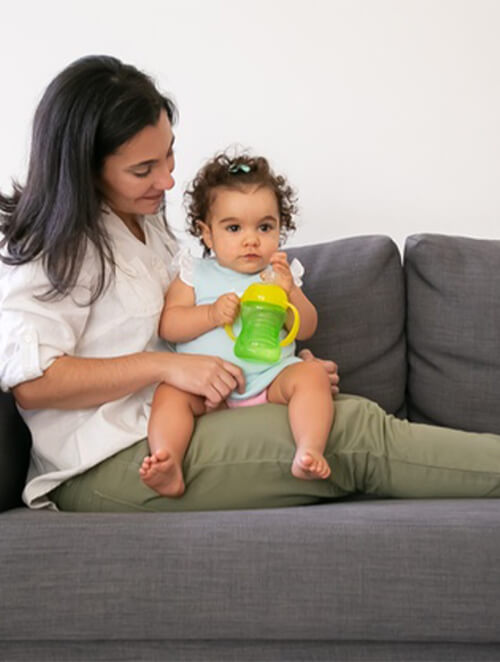Bedwetting in Kids – Symptoms, Causes and What you should do
 34702
34702

Bedwetting, also termed as nocturnal enuresis or nighttime incontinence, is unintentional urination while asleep, at an age where staying dry at night should be the norm. Wet pajamas and sheets and an embarrassed child are a familiar scene in many households; however, there is no need to be embarrassed, and it is not a sign of toilet training gone wrong. Bed-wetting is a part of a child’s development cycle. Typically, bed-wetting, before a child is seven years of age is not a matter of concern, as, at this age, your child may still be building nighttime bladder control. However, if a child continues with this pattern beyond seven, then treat the problem with understanding and patience. Bladder training, lifestyle changes, moisture alarms, and medication may also help to deal with bed-wetting. Though bed-wetting does not pose any health risks to kids, it does give rise to other complications, such as low self-esteem, loss of opportunities for social activities, and rashes on the child’s bottom or genital area.
Symptoms Of BedWetting
Usually, kids are thoroughly toilet trained by age five, but there is no target age set for achieving complete bladder control. Between the ages of five and seven, bed-wetting remains a problem for some children, and after seven years of age, few children still wet the bed. Bed-wetting could occur either every night or a few times a week, and many children who wet the bed are deep sleepers – for most kids, urinating while sleeping is the only symptom.
Causes Of BedWetting
Bed-wetting is not a behavioral or a mental issue, nor does it happen due to the child being too lazy to get out of bed to use the bathroom. There could be several things that cause bed-wetting. Some of the most common causes are: Difficulties are waking up from sleep. Stress.Genetic factors (usually runs within families). Hormonal factors such as the antidiuretic hormone are produced insufficiently – this is the hormone that slows urine production during the nights. Urinary Tract Infections A small bladder. The slow growth of the central nervous system in a child. It decreases the child’s ability to prevent the bladder from emptying at night—anomalies in the ureter in boys or girls or the urethral valves in boys.
Tips for the Guilty Working Parent
It is essential to understand that children only need ‘good enough’ and ‘happy’ parents and not parents who hover around them all the time. Ensure to come up with rituals or home routines that you will prioritize at any cost. Some examples are, being home for bedtime on certain nights, a movie night with the kids during weekends, or a family activity on certain days. Select your priorities with the school your child attends. Do ensure to make time to relax and play as a family. Organized activities are important, but children need downtime too and love and appreciate it if their parents make time to be with them at home. Also, while at home, use open-ended questions to initiate conversations and make a mindful effort to keep aside all gadgets so that you can give your children your full attention. Ensure to schedule time during the weekends to keep up with the assignments/tests from school. Train your kids to solve their problems themselves instead of giving them advice about what to do. When you are short on time, it is often easier to sort things around yourself, but enabling children to create possible solutions for their problems and letting them try those out, provides children with a sense of agency and control over their own lives.
Abnormalities In The Spinal Cord
When do Most Children Attain Bladder Control? Children attain bladder control at various ages, and if a child is younger than five years of age, treatment for bed-wetting is generally not required. Some children do not stay dry at night frequently before the age of seven. Though it may be frustrating for parents, bed-wetting up to the age of seven is not unusual. However, they should take medical/professional to sought if: Your child is seven or older and continues to wet the bed a couple of times a week. Your child is seven or older and experiences daytime and nighttime wetting.
How is BedWetting Diagnosed?
Most children who wet the bed are generally healthy, and your doctor can help determine if a medical problem is causing your child’s bed-wetting. Your doctor may ask questions related to your child’s daytime and nighttime bathroom routines. A physical exam and a urine test are also usually performed to check for diabetes or infections. Your doctor may even ask questions related to the child’s emotional well-being; however, it has been observed that children who wet the bed are not more emotionally distressed than those who do not.
How can I Help My Child?
Most children outgrow bed-wetting without being provided with any external treatments. Your doctor can guide you with medications; however, there are various behavioral treatments you can follow at home to help your child with bedwetting. Behavior therapy helps your child learn how not to wet the bed; some behavioral remedies to be tried are: Encourage your kid to urinate before bedtime and then again right before going to sleep. Limit Fluid Intake Before Bedtime. Create a reward system for dry nights; however, never punish the child if they wet the bed. You can also use a moisture alarm system that rings once the bed gets wet. It helps your child respond to the bladder sensations at night. Such alarms need to be used for at least six weeks to three months, and the child must want to use them for it to be effective. Ask your child to change the bedsheets if he or she wets the bed. Bladder training: get your child to practice holding urine for longer times during the day – this helps the bladder stretch to hold more urine. Ensure that the bathroom is easily accessible to the child at night; for example, turn on a night light in the bathroom or the hall.
Living with Bed-Wetting
Due to the guilt or embarrassment, a child may feel, bedwetting could lead to behavior problems. Your child should take responsibility for wetting the bed, and he or she can do this by helping with the cleaning and washing of the laundry; however, do not make your child feel guilty or embarrassed. You must assure your child that bedwetting is not their fault, and punishing your child will certainly not solve the problem. It may also help your child know that the exact cause of bed-wetting is unknown and that it sometimes runs in families (if you or your partner used to wet the bed as children, you should share this information with your child). Explain to your child that it is acceptable to use the bathroom during the night, and there is no need to feel afraid. You can also try and cover your child’s mattress with a plastic cover, which makes clean up easier, and do praise your child for helping with clean up. Almost all children learn to outgrow bedwetting without medicines and with behavioral therapies practiced at home. It is just a phase, so hold on as this too shall pass.
Follow us-
Instagram/ Facebook/ Youtube/ Pinterest





Leave a Reply